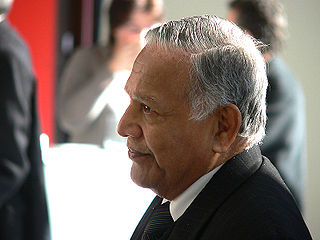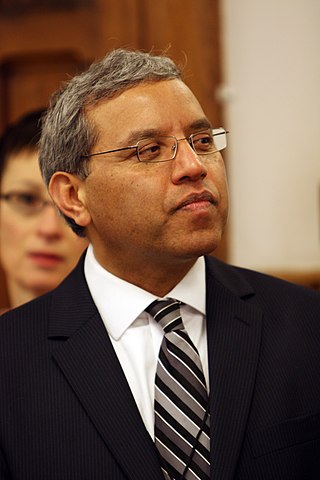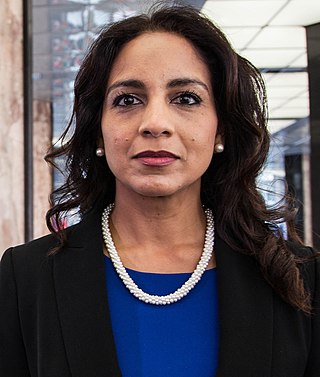Related Research Articles

Debt bondage, also known as debt slavery, bonded labour, or peonage, is the pledge of a person's services as security for the repayment for a debt or other obligation. Where the terms of the repayment are not clearly or reasonably stated, the person who holds the debt has thus some control over the laborer, whose freedom depends on the undefined debt repayment. The services required to repay the debt may be undefined, and the services' duration may be undefined, thus allowing the person supposedly owed the debt to demand services indefinitely. Debt bondage can be passed on from generation to generation.

Sexual slavery and sexual exploitation is an attachment of any ownership right over one or more people with the intent of coercing or otherwise forcing them to engage in sexual activities. This includes forced labor, reducing a person to a servile status and sex trafficking persons, such as the sexual trafficking of children.

Slavery in Canada includes historical practices of enslavement practiced by both the First Nations during the pre-Columbian era, and by colonists during the period of European colonization.
Monash University Faculty of Law, or Monash Law School, is the law school of Monash University. Founded in 1963, it is based in Melbourne, Victoria and has campuses in Malaysia and Italy. It is consistently ranked as one of the top law schools in Australia and globally, and entry to its Bachelor of Laws (LLB) programme is highly competitive.
Forced prostitution, also known as involuntary prostitution or compulsory prostitution, is prostitution or sexual slavery that takes place as a result of coercion by a third party. The terms "forced prostitution" or "enforced prostitution" appear in international and humanitarian conventions, such as the Rome Statute of the International Criminal Court, but have been inconsistently applied. "Forced prostitution" refers to conditions of control over a person who is coerced by another to engage in sexual activity.Many women live through this type of abuse everyday remains unknown.
The Castan Centre for Human Rights Law is a research centre located within the Monash University Law Faculty in Victoria, Australia. It was established in 2000 to cater for the study of human rights law globally, regionally and in Australia, and grew rapidly to become the largest research centre in the Monash Law School. As of 2022 it led by Melissa Castan.

James Hathaway is a Canadian-American scholar of international refugee law and related aspects of human rights and public international law. His work has been frequently cited by the most senior courts of the common law world, and has played a pivotal role in the evolution of refugee studies scholarship. Hathaway pioneered the understanding of refugee status as surrogate or substitute protection of human rights, authored the world's first comprehensive analysis of the human rights of refugees, merging doctrinal study of refugee and human rights law with empirical analysis of the state of refugee protection around the world and directed a groundbreaking multidisciplinary and global team of scholars and officials in an initiative to reconceive the structures of refugee protection more fairly to share burdens and responsibilities. Hathaway also convened the Michigan Colloquium on Challenges in International Refugee Law, which met eight times between 1999 and 2017 to formulate guidelines to resolve cutting-edge concerns on both refugee status and refugee rights under international law. An archive of Hathaway’s scholarly working papers has been established at the University of Michigan’s Bentley Historical Library.

Sri Lankabhimanya Christopher Gregory Weeramantry, AM was a Sri Lankan lawyer who was a Judge of the International Court of Justice (ICJ) from 1991 to 2000, serving as its vice-president from 1997 to 2000. Weeramantry was a judge of the Supreme Court of Sri Lanka from 1967 to 1972. He also served as an emeritus professor at Monash University and as the president of the International Association of Lawyers against Nuclear Arms.

The continent of Africa is one of the regions most rife with contemporary slavery. Slavery in Africa has a long history, within Africa since before historical records, but intensifying with the trans-Saharan and Indian Ocean slave trade and again with the trans-Atlantic slave trade; the demand for slaves created an entire series of kingdoms which existed in a state of perpetual warfare in order to generate the prisoners of war necessary for the lucrative export of slaves. These patterns persisted into the colonial period during the late 19th and early 20th century. Although the colonial authorities attempted to suppress slavery from about 1900, this had very limited success, and after decolonization, slavery continues in many parts of Africa despite being technically illegal.
Aaron Ronald Castan was an Australian barrister and human rights advocate.
Sarah Louise Joseph is an Australian human rights scholar. She is the Director of the Castan Centre for Human Rights Law at Monash University, a position she has held since 2005.
Kevin Harcourt Bell is a former judge of the Supreme Court of Victoria, in the Australian state of Victoria.

Voluntary slavery, in theory, is the condition of slavery entered into at a point of voluntary consent. It is distinguished from involuntary slavery where an individual is forced to a period of servitude usually as punishment for a crime.
Satvinder Singh Juss FRSA, is a British academic and professor. He is professor of law at King's College London and a barrister-at-law in Gray's Inn. He has published widely on the subjects of migration and international human rights law.

Siddharth Kara is an American author, activist, and expert on modern-day slavery and human trafficking, child labor, and related human rights issues. He is a British Academy Global Professor, an Adjunct Lecturer in Public Policy at the Kennedy School of Government at Harvard University and the University of California, Berkeley, and an associate professor at the University of Nottingham. He is best known for his book trilogy on modern slavery: Sex Trafficking: Inside the Business of Modern Slavery (2009), Bonded Labor: Tackling the System of Slavery in South Asia (2012), and Modern Slavery: A Modern Perspective (2017).

Surya Prasad Subedi, OBE, KC, DCL is an international jurist. He is Professor of International Law at the University of Leeds, a member of the Institut de Droit International, and a Barrister in London. He also is a visiting professor on the international human rights law programme of the University of Oxford. He served as the United Nations special rapporteur for human rights in Cambodia for six years (2009-2015). He also served for five years, starting in 2010, on an advisory group on human rights to the British Foreign Secretary. In 2021, he was appointed legal procedural advisor to the World Conservation Congress of the International Union for Conservation of Nature held in Marseille, France. He has written a number of works on the theory and practice of international law and human rights and acted as a counsel in a number of cases before the international courts and tribunals, including the International Court of Justice. In 2022, he was appointed to the list of arbitrators under the UK-EU Trade and Cooperation Agreement (TCA).
Anne Therese Gallagher is the President of the International Catholic Migration Commission and the Director-General of the Commonwealth Foundation, the intergovernmental arm of the Commonwealth charged with supporting civil society throughout its 53 member states. An Australian born lawyer, practitioner and scholar, she is considered to be an international authority on transnational criminal law, migration and human rights and, according to the 2012 Trafficking in Persons Report prepared by the United States Department of State, is 'the leading global expert on the international law on human trafficking’.

Slavery in Niger involves the most number of slaves that had been enslaved. Different practices which have been practiced in the Sahel region for many centuries and which persist to this day. The Bornu Empire in the eastern part of Niger was an active part of the trans-Saharan slave trade for hundreds of years. Other ethnic groups in the country similarly had a history of slavery, although this varied and in some places slavery was largely limited to the political and economic elite. When the French took control of the area they largely ignored the problem and only actively banned the trade in slaves but not the practices of slavery. Following independence, many of the major slave holders became prominent political leaders in both the multiparty democracy period and the military dictatorship, and so the problem of slavery was largely ignored. In 2003, with pressure from the anti-slavery organization Timidria, Niger passed the first law in Western Africa that criminalized slavery as a specific crime. Despite this, slavery persists throughout the different ethnic groups in the country, women are particularly vulnerable, and a 2002 census confirmed the existence of 43,000 slaves and estimated that the total population could be over 870,000 people. The landmark Mani v. Niger case was one of the first instances where a person won a judgement against the government of Niger in an international court for sanctioning her slave status in official decisions.

The International Abolitionist Federation, founded in Liverpool in 1875, aimed to abolish state regulation of prostitution and fought the international traffic in women in prostitution. It was originally called the British and Continental Federation for the Abolition of Prostitution.

Parosha Chandran is a Professor of Practice in Modern Slavery Law in The Dickson Poon School of Law, King's College London. She is also a human rights barrister at One Pump Court and an expert advisor on human trafficking law for the United Nations and the Council of Europe.
References
- ↑ ALLAIN, Jean - Personal Data. OHCHR.
- 1 2 3 "Jean Allain". Monash University.
- 1 2 "Jean Allain". www.hull.ac.uk.
- 1 2 3 4 "World-leading anti-slavery expert Prof Jean Allain joins Monash Law". Faculty of Law.
- ↑ "Jean ALLAIN | Professor | BA, MA, LLM, PhD | Monash University (Australia), Melbourne | Faculty of Law". ResearchGate.
- ↑ "Katalog der Deutschen Nationalbibliothek". portal.dnb.de.
- ↑ "Katalog der Deutschen Nationalbibliothek". portal.dnb.de.
- ↑ "Bellagio-Harvard Guidelines on the Legal Parameters of Slavery". Castan Centre for Human Rights Law.
- ↑ Allain, Jean. "Neubestimmung eines alten Begriffs: Sklaverei und internationales Recht | APuZ". bpb.de.